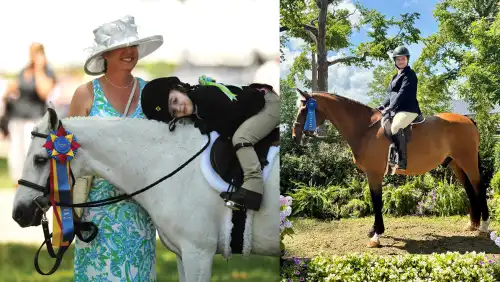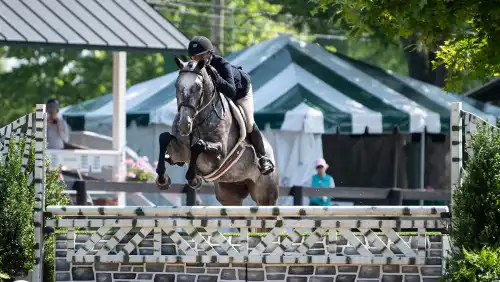How do we handle issues of horse abuse? That was the topic of discussion Monday, Feb. 19, during this month’s U.S. Hunter Jumper Association Town Hall, led by USHJA President Mary Knowlton. Thanks to several high-profile incidents in the horse industry, including the recent suspension of Olympic dressage rider Cesar Parra by the Fédération Equestre International and subsequently the U.S. Equestrian Federation, taking action against horse abuse has been at the forefront of discussions amongst equestrians. But tackling the problem isn’t as black and white as many would like it to be.
On Feb. 12 USEF released a proposed extraordinary rule change that would expand the federation’s jurisdiction to include horse abuse that occurs outside of competition, mandate reporting of abuse, and clarify that competition management and officials have the authority to eliminate, disqualify or issue warnings in cases of horse abuse. The proposal also includes new language defining abuse as “any action or omission that causes or is likely to cause pain or unnecessary discomfort to a Horse,” and provides 21 examples.
Many of the examples were already included in the current rule, but new additions include: using a device or equipment that causes excessive pain to the horse; jabbing the horse in the mouth with a bit or other device; showing or training a horse with raw, bleeding or irritated skin, or welts consistent with excessive, persistent, or inappropriate use of equipment, including spurs; showing or training a horse with any evidence of the use of improper training techniques; showing or training an exhausted, lame or injured horse; excessive longeing or excessive competing of a horse.
But what exactly determines words like excessive, improper and inappropriate? They can mean different things to people, and therein lies the problem.
“Part of what we’re going to do as a sport is try to figure out what is appropriate and what is not appropriate,” Knowlton said. “I think there’s some people who say that old saw about, ‘You know pornography when you see it,’ but I am not necessarily sure in [this] world that we all agree on what is abusive and what is not.”

Knowlton acknowledged that even when someone sees what they deem to be abuse, they don’t always come forward. She relayed stories of exhibitors who reported abuse and were punished or ridiculed by others for doing so, and a tale from a steward who witnessed abuse, but others in attendance weren’t willing to speak up as well.
“Did those people see something different? Are they afraid? Are they habituated? I’m not really sure,” Knowlton said.
Barbara Filippelli, an ‘R’ judge and trainer out of New York, emphasized that taking action to address abuse would be uncomfortable, but it’s necessary.
“These are unprecedented times,” she said. “All of my clients, we talk about this literally on a daily basis with what happened, or with what Cesar Parra has done. It’s uncharted times, and it’s going to be hard. People say people are going to be accused of things they shouldn’t be, and it’s going to be a crazy time. Yeah, it is. But we’re all going to have to stick together and do what’s best of the horse and just navigate these times. Such as the beginning of—and if people get mad at me, I’m sorry—the #MeToo movement and SafeSport. The beginning of something amazing. So here we are. There’s not a lot of easy answers for sure.”
Giving The Rules Teeth
ADVERTISEMENT
Once abuse is identified, how USEF reacts was another primary concern for town hall attendees. In Parra’s case, because the videos of him were taken off competition grounds, the federation was unable to suspend him but reciprocated when the FEI did. If the rule change proposal giving the federation that power passes during the mid-year board meeting in June, USEF will be able to take its own action at the start of the 2025 competition season.
Attendees bemoaned that the federation was slow to react in Parra’s situation, but Knowlton pointed out that it’s unlikely people will see the immediacy the modern world craves.
“I think that any organization is going to take their time,” she said. “They’re not going to waste time, but they are going to really look at things, so that they are building a strong case either for or against what happened.”
Several stewards and judges chimed with their own experiences in addressing abuse at horse shows. Certain acts, such as jerking on the reins or kicking, can often be addressed through a conversation and some education on how that behavior isn’t permitted. Janet Fall, a steward and jumper judge from California, said she’ll take the offender aside in less egregious situations and give them a warning, stipulating that if the behavior is seen again, she would take action through a yellow card or an official report.
“Normally when you put it that way, they get the message, and if they don’t, you just go on with it because you warned them, they know what’s going to happen,” she said. “If they want to continue, then they’re doing it to themselves.”
Fall pointed out that currently yellow cards are not available to officials, and whenever she has an incident at a multi-day or multi-week show she makes sure the management team knows who received a warning so that incoming officials are aware of previous warnings.
“That’s part of the problem too,” she said. “If you don’t know what happens from week to week, you can warn them every week, and they can get away with it until they come back in front of you.”
Nannet Read, a steward from Florida, relayed her frustration over how an incident she reported while at the World Equestrian Center—Ocala (Florida) last June was handled by USEF. In that instance, video footage, eyewitness testimony and written statements from five members were submitted after horses were found in an enclosed trainer on a hot day, and one horse exhibited signs of distress. The rider in question, Ashlynn Meuchel, received a $2,500 fine and was suspended for two months.
“This is after them telling me this was one of the worst horse abuse cases that they had seen, and if this is what we’re going to do, we as licensed officials don’t want to spend our time,” she said. “I spent two weeks on this case sending them information, and to have this happen was heartbreaking. This animal was sweaty; he was bloody. It was horrendous.
“If we cannot make them send these cases to a hearing committee and not let these employees at USEF make these decisions, we’re wasting our time,” she continued.
ADVERTISEMENT
When reports of abuse make it to the federation, USEF has guidelines determining which penalties can be given, and Knowlton acknowledged which penalty is most effective can differ depending on the person.
“For some people, a financial penalty is meaningless because they can pay it and just go on,” she said. “It’s the being set down that is more painful to those people, and that is also, I think, very humiliating to people.”

The discussion all led back to “social license to operate,” and one anonymous attendee pointed out that if the community doesn’t address abuse internally, it will lead to a public relations nightmare. Utah-based Shasta Parry warned about the bystander effect and encouraged members to stand up when they see abuse and not assume someone else will report it.
“It’s never right, but some people don’t generally do that and just have a really bad day and their temper got the better of them and they’re acting inappropriately. Some people are much nastier, but we as a sport have to make that not OK,” she said. “We do have to be brave enough to say something about it when we see it, and that is not easy. It is so much easier to think that someone else will do it. It’s hard to think that you might be mocked by your peers—that seems to be a really big punishment for a lot of people—but you are the horse’s voice, so that’s super important.”
Bringing Education To The Table
Many suggested that the USHJA Trainer Certification Program should become mandatory, something that Knowlton said is currently not an option due to legal reasons. Parry suggested that if parents said they would only let their children ride with trainers who were certified and encouraged other parents to do the same, that it might incentivize more trainers to take part in the program.
Lauren Lockliear-Narducci, a trainer from California, pointed out that many riders and families choose trainers based on their ability to win ribbons but instead should look deeper.
“The education really needs to be centered around the parents, as someone mentioned, that ribbons aren’t the end of the world, not winning a class or not doing as well as you hoped at the horse show, that’s a part of life,” she said. “For parents to out and be picking a trainer, if they’re not educated, they think, ‘Oh, this trainer is winning things, so they must be good.’ I don’t know what the solution is to this, but I think educating trainers and clients at the end of the day to say, ‘Hey, the most important thing is you learned something, your horse is happy, and your horse learns something; not that you won a ribbon.’ ”
The virtual town hall meetings will occur monthly through October, with the next scheduled for 7 p.m. Eastern Time on March 25.
Coverage of the first town hall of the year, which focused on social license to operate, can be found here.














